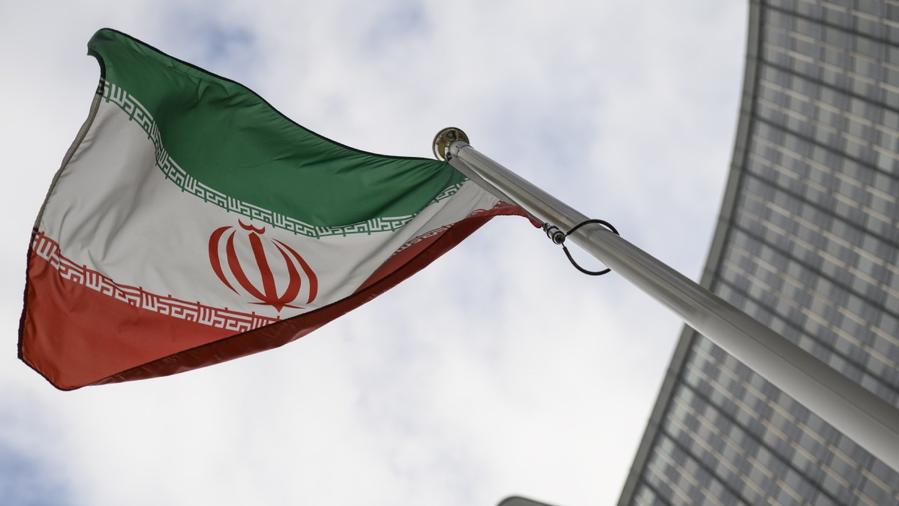 A flag of Iran flies in front of the International Atomic Energy Agency (IAEA) headquarters during a virtual IAEA Board of Governors meeting at the IAEA headquarters of the UN seat in Vienna, Austria, Nov 24, 2021. (PHOTO / IC)
A flag of Iran flies in front of the International Atomic Energy Agency (IAEA) headquarters during a virtual IAEA Board of Governors meeting at the IAEA headquarters of the UN seat in Vienna, Austria, Nov 24, 2021. (PHOTO / IC)
HONG KONG – Countries that accuse Iran of engaging in dangerous nuclear activities are displaying double standards if they turn a blind eye to their own activities and responsibilities, analysts say.
At the opening of the Tenth Review Conference of the Parties to the Treaty on the Non-Proliferation of Nuclear Weapons, going on in New York from Aug 1 to Aug 26, United Nations Secretary-General Antonio Guterres warned that humanity is “just one misunderstanding, one miscalculation away from nuclear annihilation”.
At the conference on Aug 5, Majid Takht-Ravanchi, Iran’s ambassador to the UN, was quoted by the country’s English-language daily, Tehran Times, as saying that non-proliferation provisions “should be applied globally and without exception”.
Takht-Ravanchi regretted the application of “double standards” in enforcing non-proliferation provisions with regard to Israel which Iran said developed nuclear weapons “with the support and assistance of the United States”.
Iran has actually been a major proponent of turning the Middle East into a nuclear-free zone, a proposal that has been actively opposed by Israel and the US.
Mehran Kamrava, Professor of Government, Georgetown University, Qatar
He described Iran as “a steadfast supporter of nuclear disarmament” which is equally committed to nuclear non-proliferation.
Asadollah Eshragh Jahromi, director general for international peace and security in the Foreign Ministry of Iran, said that despite the nuclear disarmament obligations under the Treaty on the Non-proliferation of Nuclear Weapons, or NPT, and the commitments made in the 2000 and 2010 NPT Review Conferences, Washington’s nuclear policy had escalated matters.
Eshragh Jahromi said the US advocated tremendous build-up of its nuclear arsenal and delivery systems, allowed the first use of such weapons, threatened to use them against non-nuclear-weapon states, and has authorized the development of new types of low-yield nuclear weapons. He also decried the United Kingdom’s increased stockpile of nuclear weapons.
“Iran has consistently complained about US and EU (European Union) double standards concerning its non-existent nuclear weapons program and their complete blind eye toward their own and Israel’s nuclear weapons,” Mehran Kamrava, a professor of government at Georgetown University in Qatar, said.
“Iran has actually been a major proponent of turning the Middle East into a nuclear-free zone, a proposal that has been actively opposed by Israel and the United States,” he added.
The UN secretary general also said that humanity was in danger of forgetting the lessons of the nuclear bombings of Hiroshima and Nagasaki at the end of World War II as geopolitical tensions reach new lows and countries stockpile “doomsday weapons that have no place on the planet”.
Negotiations to restore the 2015 Iran nuclear deal have been ongoing since April last year after former US president Donald Trump unilaterally abandoned it in 2018.
On Aug 14, Tasnim News Agency reported that Russia’s Permanent Representative to International Organizations in Vienna, Mikhail Ulyanov, said that the final agreement on the restoration of the Joint Comprehensive Plan of Action or JCPOA, and removal of anti-Iran sanctions may be reached soon.
“The United States imposed additional sanctions on Iran’s oil exports just before the start of the latest round of talks in Vienna. This does not show good faith in negotiations, and makes the possibility of a deal all the more difficult,” said Kamrava.
“But there seems to be renewed desire by all sides to reach a workable and equitable deal,” he added.
Asif Shuja, an Iran expert and senior research fellow at the Middle East Institute at National University of Singapore, said that nuclear non-proliferation is viable only if it is pursued simultaneously with nuclear disarmament.
He added that while the Comprehensive Nuclear-Test-Ban Treaty or CTBT, is an important tool to attain nuclear disarmament, the US’ role in this effort “is not very helpful”.
He said, for the CTBT to enter into force, a list of 44 states is required to ratify it. However, the US is one of the eight states which has so far not done so.
“This implies that one way of saving the world from nuclear annihilation could also be by way of lessening the traditional conflicts between the states,” said Shuja.
The landmark Non-Proliferation Treaty aims to prevent the spread nuclear weapons and weapons technology, to promote cooperation in the peaceful uses of nuclear energy, and to further the goal of achieving nuclear disarmament in a general and complete sense.
The treaty entered into force in 1970, and on May 11, 1995, the treaty was extended indefinitely. A total of 191 states have joined the treaty, including the five nuclear-weapon states, China, France, Russia, the United Kingdom, and the US.
Contact the writer at jan@chinadailyapac.com


